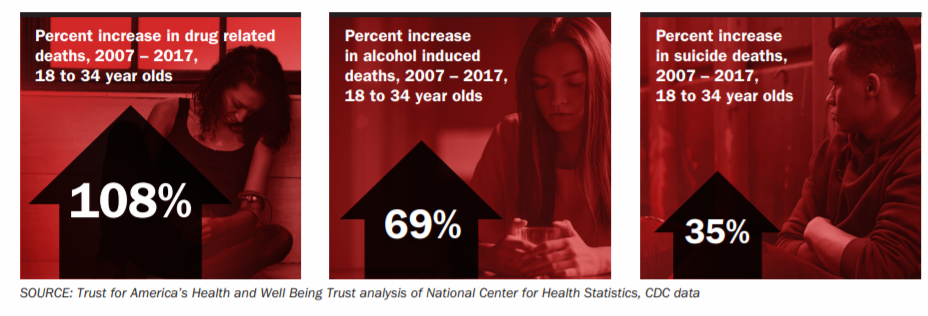
Suicide and substance abuse deaths are dramatically increasing in Millennials. The opioid crisis and increased drinking substantially contributed to the 36,000 millennials who died in 2017 alone.
Depression, anxiety, and other mental health issues are increasing in our young adults, and this is a major contributing factor. Our society moves at a rapid, overwhelming pace. The media continually saturates our minds with reasons to worry, feel sad, and want to escape.

As the founder of Addiction Hope & Eating Disorder Hope, I continually hear from 18 to 35-year-old folks struggling to find hope and meaning in their lives. They repeatedly report feeling sad and that their existence seems pointless. That profound sense of emptiness is brutally painful to experience, let alone tolerate which can lead to suicide and substance abuse.
Escaping and Numbing Out
Many millennials try to escape the pressure and uncomfortable feelings by drugging, drinking, watching pornography, overeating, undereating, over-exercising, etc. Many paths to try in order to create relief from the pain - unfortunately, all lead to destructive outcomes.

These individuals enjoy superior technology and are often dialed into their phones, PC, etc. all of their waking hours. Yet, they feel disconnected and lonely.
Craving a sense of belonging, many also feel addicted or, at least, dependent on social media to stay involved with others. Yet, this form of connection generally proves to leave them more dissatisfied, feeling alone, and sadly, turning to suicide and substance abuse.
Connection and Belonging
If you are feeling isolated, anxious, and depressed, reach out to others. We are designed to be in relationship and need the love, comfort, and companionship of one another. No man is an island.
Accepting our interdependence with others is humbling. We live in a society that encourages rugged individuality and self-containment. However, our hearts and souls need to feel connected and understood by others. This is the human condition, and none of us are an exception to this.
Though the beer, oxycontin, or weed may seem like the most efficient technique to get out of emotional pain, it is really just a temporary distraction. Addressing our human needs for love and belonging is a far more rewarding and long-reaching improvement to our lives.
5 Easy Steps to Connect with Others
 Here are five easy steps you can take today to make life-affirming choices to establish true companionship & interpersonal connection in your life:
Here are five easy steps you can take today to make life-affirming choices to establish true companionship & interpersonal connection in your life:
1. Call a friend and set up a hike, dinner or movie
2. Reach out to family and authentically share your desire to know them better
3. Join a local softball team, bowling league or group fitness class and get to know your fellow members
4. Make cookies for your neighbor, deliver them and get to know them
5. Reach out to a therapist to learn ways to establish more meaningful connections and relationships in your life
Suicide and substance abuse and eating disorders are born of isolation. Even if you are just feeling a bit depressed and anxious, go ahead and reach out and engage with others.
You can craft a life of rich meaning and belonging.
If You Know Someone in Crisis: Call the toll-free National Suicide Prevention Lifeline (NSPL) at 1–800–273–TALK (8255), 24 hours a day, 7 days a week.
The service is available to everyone. The deaf and hard of hearing can contact the Lifeline via TTY at 1–800–799–4889.
All calls are confidential. Contact social media outlets directly if you are concerned about a friend’s social media updates or dial 911 in an emergency. Learn more on the NSPL’s website.
The Crisis Text Line is another resource available 24-hours a day, 7-days a week. Text “HOME” to 741741.
Source:
1. Remaly, J. (2019, June 15). Deaths from drugs, alcohol, and suicide increase among millennials.
2. Retrieved June 17, 2019, from https://www.mdedge.com/psychiatry/article/202914/addiction-medicine/deaths-drugs-alcohol-and-suicide-increase-among
3. Ducharme, J. (2019, June 13). More Millennials Are Dying 'Deaths of Despair,' Report Says. Retrieved July 17, 2019, from https://time.com/5606411/millennials-deaths-of-despair/
4. https://wellbeingtrust.org/wp-content/uploads/2019/06/TFAH-2019-YoundAdult-Pain-Brief-FnlRv.pdf
5. https://www.apa.org/pubs/journals/releases/abn-abn0000410.pdf
6. https://www.mdedge.com/psychiatry/article/202914/addiction-medicine/deaths-drugs-alcohol-and-suicide-increase-among
7. iGen by Jean M. Twenge, PhD
About the author:

Jacquelyn Ekern, MS, LPC founded Addiction Hope® in January 2013, after experiencing years of inquiries for addiction help by visitors to our well-regarded sister site, Eating Disorder Hope®.
Many of the eating disorder sufferers that contact Eating Disorder Hope also had a co-occurring issue of addiction to alcohol, drugs, and process addictions (such as gambling, sex, shopping, etc).
Because she believes in holistic recovery that addresses all of the destructive patterns or behaviors engaged in by the individual, it became clear that it would be helpful to also have a site that deals foremost with addiction, for those that suffer from addiction as a primary concern.
Jacquelyn Ekern is a licensed therapist and she is President of Ekern Enterprises, Inc. which operates both the Addiction Hope and Eating Disorder Hope organizations and websites.
Jacquelyn enjoys art, working out, dogs, reading, painting and time with family.
The opinions and views of our guest contributors are shared to provide a broad perspective of addictions. These are not necessarily the views of Addiction Hope, but an effort to offer a discussion of various issues by different concerned individuals.
We at Addiction Hope understand that addictions result from multiple physical, emotional, environmental and genetic factors. If you or a loved one are suffering from an addiction, please know that there is hope for you, and seek immediate professional help.
Published June 20, 2019 on AddictionHope.com
Reviewed by Jacquelyn Ekern, MS, LPC on June 20, 2019
